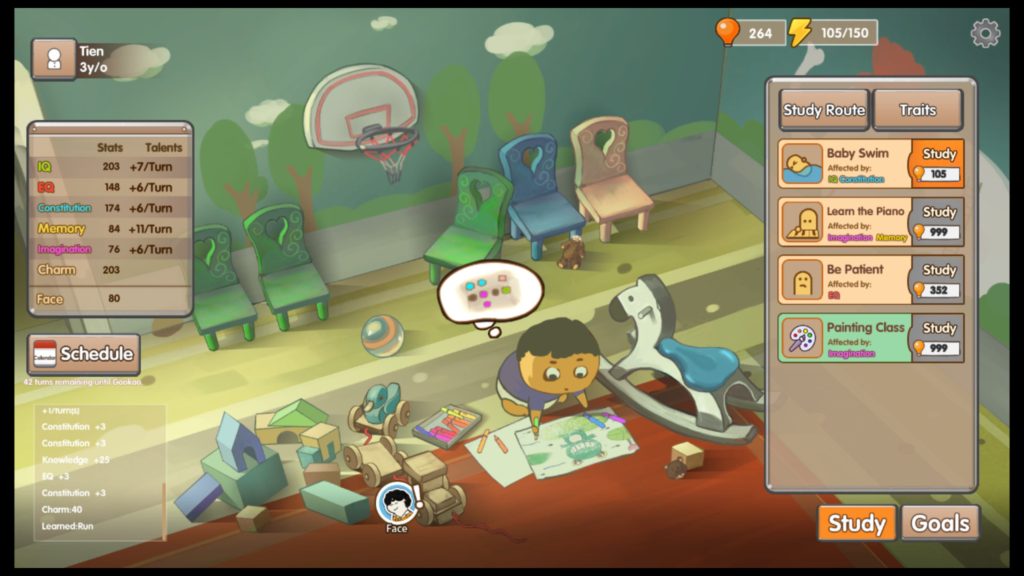
This is another game by a Chinese developer and after hearing about its premise I knew I just had to try it out no matter how poorly made or not it is. As you can tell by its title, it’s a kind of life sim in which you guide a child from infancy to the gaokao, China’s National College Entrance Examination. making choices on how to spend your time and which skills and studies to focus on. Along the way, you’ll have to grapple with meeting the expectations of your strict parents, avoid having a mental breakdown due to over-studying and maybe even make some friends or kindle a bit of romance as you grow up.
Time management games tend to be boring affairs, being usually seen as little more than prettied up spreadsheet games with random events thrown in. I do have a fondness for the genre despite these problems, Academagia being an example of a game of this type. Thankfully Chinese Parents doesn’t try too hard to actually be a day-to-day simulation of growing up or even much of a simulation at all. Everything is highly abstracted and there are plenty of quirky mini-games representing different parts of school life. Even the amount of time a turn in the game represents varies. Early on, a turn represents a whole year but as you get closer and closer to the date of the gaokao, a turn represents a shorter and shorter amount of time. Regardless there is a fixed number of turns but at the end of the game you can start a new generation, this time buoyed up by the advantages you managed to secure.
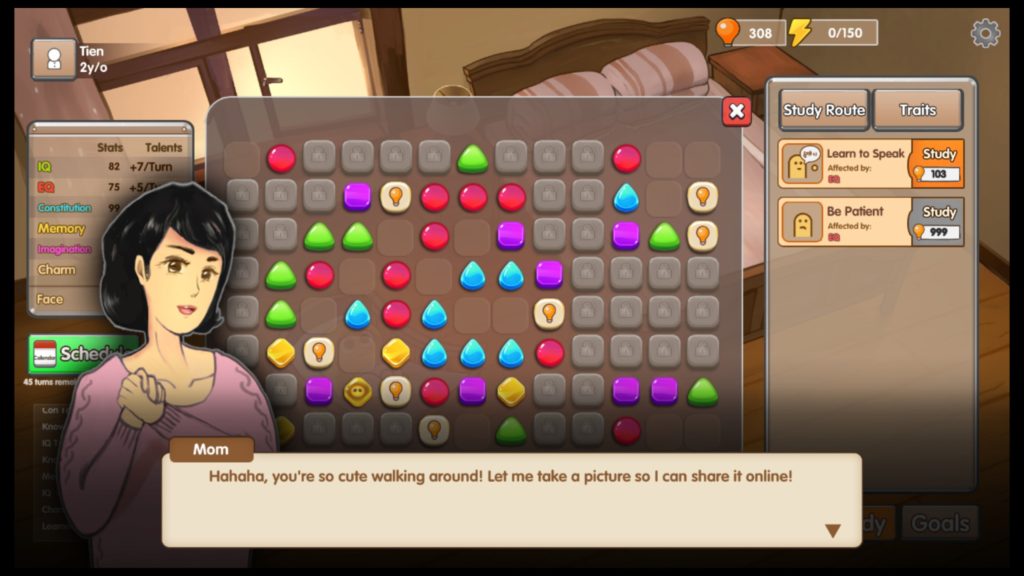
Most of your time is spent staring at a screen that initially looks like tile-matching mini-game but is actually far simpler. With a limited number of actions available, you simply have to click tiles to obtain bonuses to stats like IQ, EQ, Constitution etc. Other special tiles allow you to jump to the next map, get more energy or get all of the uncovered tiles of the same color in one go and so on. There’s really no thought or challenge involved except that it’s usually a good idea to clear as many as the covered tiles as possible in order to find the good ones. You can also get Knowledge points this way and you spend those points to buy skills, everything from Learning to Walk to Algorithms 101. Stats modify the Knowledge cost of buying skills, meaning that a high IQ makes buying math skills for example cheaper.
In between these turns, you do get to decide how to spend your time and you only ever have six slots free every turn. You can allocate these to practising the skills you have learned, like riding a bicycle or studying ancient Chinese poetry or whatever and gain the corresponding bonuses. But studying actions also causes Stress to increase so you have to allocate some slots to relaxing actions like watching cartoons or playing video games. These actions will also give different types of stat bonuses, like Imagination for example, and cause parent Satisfaction to drop. Most importantly, these actions can give your character traits, so practicing at the children’s electric piano can give you the legendary Piano Beast trait. You use these traits to compete and win in the face challenge mini-games in which parents boast to one another about how talented their children.
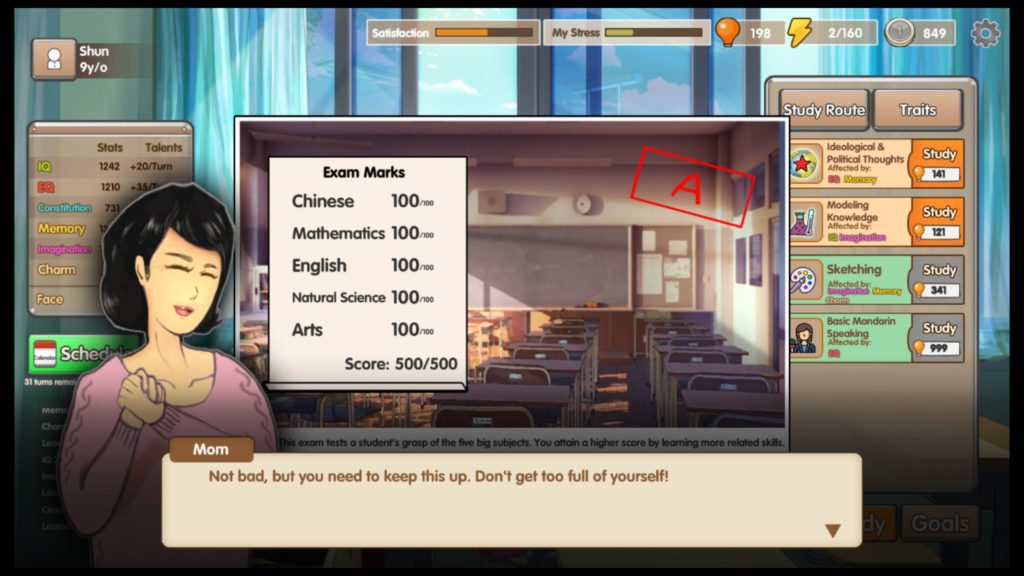
There are other mini-games but I won’t go into all of them. The upshot is that everything really is highly abstracted, so much as that there’s only a very loose relationship between the game mechanics and the underlying things they are meant to represent. For example spending more time practising a skill doesn’t matter. Once you have that skill, that’s it and you won’t get any better. The only reason to practise it is to use it to grind basic stats or to gain the associated trait. Furthermore contrary to what you may expect, stress is not really a big deal in this game as you can easily use your pocket money to buy stress reducing items. There’s no real difference between the options in the study tab and those in the entertainment tab either when allocating actions. You may think it would make sense that the study options are better but in fact there are far, far better entertainment options that give you massive, massive stat gains and either only cost very little stress or even reduce your stress, provided you manage to unlock them. Good examples of this are managing to persuade your parents to take you travelling in China, Southeast Asia or even Europe.
That leads to the observation that there’s not even the slightest semblance of balance in this game. Romance is almost impossibly difficult as a boy and very easy as a girl. Late game options like studying past exam questions are so powerful as to make all prior actions meaningless. Getting a legendary trait early in the game allows you to coast past all of the talent shows using that alone. There’s all kinds of randomness everywhere as well, such as how many levels the mind map has, or how many times you need to repeat an action to get that coveted trait, or even a random event triggers to give you bonus actions and parental requests and so on. This means that it’s not worth trying to play it as a serious strategy game. In fact, I believe that the gaokao itself doesn’t really mean anything. Sure, your parents will be very unhappy if you keep getting awful grades but what really matters is picking a career track you want and then grinding the stats and skills you need to complete that track.
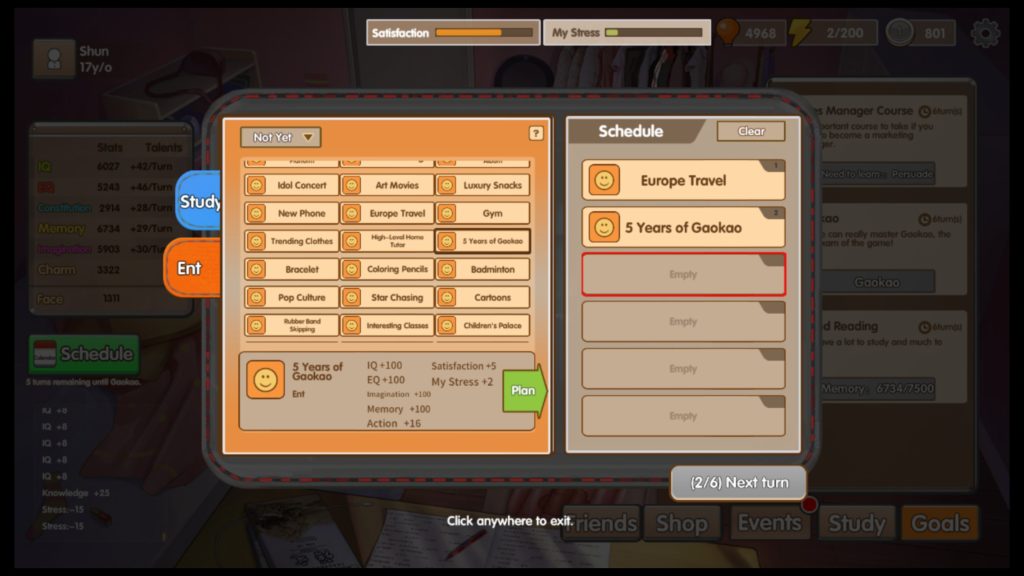
All that said, the game is rather fun and addictive the first couple or so times through. There are all kinds of jokes and references and I rather enjoy it as a self-deprecating way of looking at Chinese culture. For example, in the ang pow receiving mini-game the objective is of course ultimately to receive the ang pow and hence the cash. But you’re supposed to accept it only after rejecting it enough times. Accept too quickly and your mother confiscates the money, claiming that you’re rude. Reject too strenuously and the relative does give up on giving the ang pow to you and your mother scolds you for not accepting your relative’s good wishes. There’s also rampant misogyny which is part of the fun. Take up computer studies as a girl and your father will comment that it’s not a suitable subject for girls. But most of all, there is the cut-throat materialism and competition for status. In the face challenges for example, you can be as talented as you want but still feel useless when the opponent flaunts immense wealth to score massive damage. In the very first generation, your family has no talent in anything and little money so it’s best to content yourself with being an ordinary joe. But in his game, both talent and wealth carries across generations so by the third or fourth generation, achieving ridiculously high stats suddenly seems all too possible.
Some people are apparently capable of playing this game for more than 10 generations. I find that mind boggling as there is just not that much content in the game. The events, friends, life choices etc. are exactly the same across generations, down to being bullied right on schedule, so it won’t take long before you’ve seen all there is to see. You can try to collect all of the traits, get to the top of different career tracks, romance different girls etc. but it gets repetitive really fast and eventually the lack of rigor in the mechanics just feels annoying. Your parents’ choice of career in the previous generation doesn’t even affect anything, only how much they provide as pocket money. In the end, it’s a very shallow game and you don’t even have multiple storylines going on in it. It is fun to explore it for a bit, just don’t expect it to have much staying power.
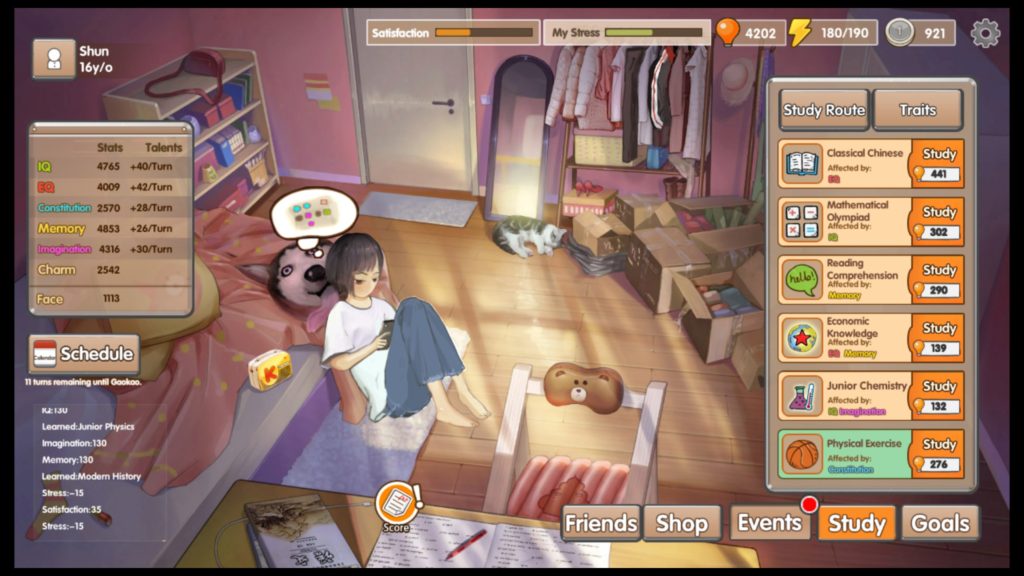
One thought on “Chinese Parents”